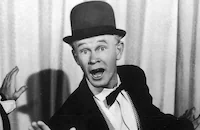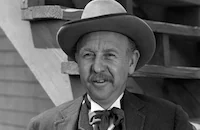The Witness Chair

Brief Synopsis
Cast & Crew
George Nicholls Jr.
Ann Harding
Walter Abel
Douglass Dumbrille
Frances Sage
Moroni Olsen
Film Details
Technical Specs

Synopsis
When Lieutenant Poole and his assistant Costigan find the body of Stanley Whittaker holding a gun and a typewritten confession of guilt in a $75,000 embezzlement scheme, their first assumption is suicide. After examining the evidence more closely, however, they conclude that Whittaker was murdered and arrest their prime suspect, James Trent, the vice-president of the Whittaker Textile Corporation, whose gun delivered the fatal shot. In court, several witnesses, including Paula Young, Whittaker's secretary, who is in love with James, give testimony concerning James's activities on the day of the murder. Although Paula admits that she knew that Whittaker had bribed the company accountant, Henshaw, to redo the books so that the embezzled funds would show up in James's department, she fails to mention that she was in the office on the night of the murder. She also neglects to say that Connie Trent, James's daughter, had come to her apartment that same night, after nearly running off to Europe with Whittaker. On the stand, James admits that he had found out about Whittaker's frame-up on the day of the murder, but denies that he committed the crime. After testimony from James's secretary and an elevator operator, Connie is called to the witness chair, where she is forced to confess her secret romance with Whittaker. Fuelled with this new evidence, the prosecution then proposes that James had murdered Whittaker because of Connie. James's case appears hopeless until Paula stands up in court and announces that she killed Whittaker. Recounting the night of the murder, Paula states that when she found out about Whittaker's plans to abscond with Connie and the $75,000, she typed Whittaker's confession, which she hoped would exonerate James, and then forced him at gunpoint to sign it. During a subsequent struggle for the gun, Whittaker was shot, and Paula, fearful that Connie's affair would become public, remained silent about her involvement. After discussing her legal situation with the sympathetic judge, James takes Paula in his arms and proposes.

Director
George Nicholls Jr.
Cast

Ann Harding

Walter Abel

Douglass Dumbrille
Frances Sage

Moroni Olsen

Margaret Hamilton
Maxine Jennings

William Benedict

Paul Harvey
Murray Kinnell

Charles Arnt
Frank Jenks
Edward Le Saint
Hilda Vaughn
Barlowe Borland
Fred Kelsey
Crew
Samuel J. Briskin
George D. Ellis
Perry Ferguson
Robert De Grasse
Kenneth Holmes
Rian James
William Morgan
Bernard Newman
Van Nest Polglase
Gertrude Purcell
Cliff Reid
Roy Webb

Film Details
Technical Specs

Articles
The Witness Chair
By Frank Miller

The Witness Chair
Quotes
Trivia
Notes
A New York Times article about this film states: "After starting The Witness Chair, Miss Harding declared she was not satisfied with the script and would not continue. Briskin reminded her that the story had been purchased at her request and that she had approved the shooting script." The article also noted that in order to force Harding to finish the film, RKO threatened to sue her for the money already spent on the production, a total of $80,000. The Witness Chair was the last film of Harding's RKO contract. She did not make another film at the studio for many years. Hollywood Reporter production charts add Louise Latimer, George Offerman, Jr., Harry Bowen, Alan Curtis and Tony Martin to the cast, but their participation in the final film has not been confirmed.














